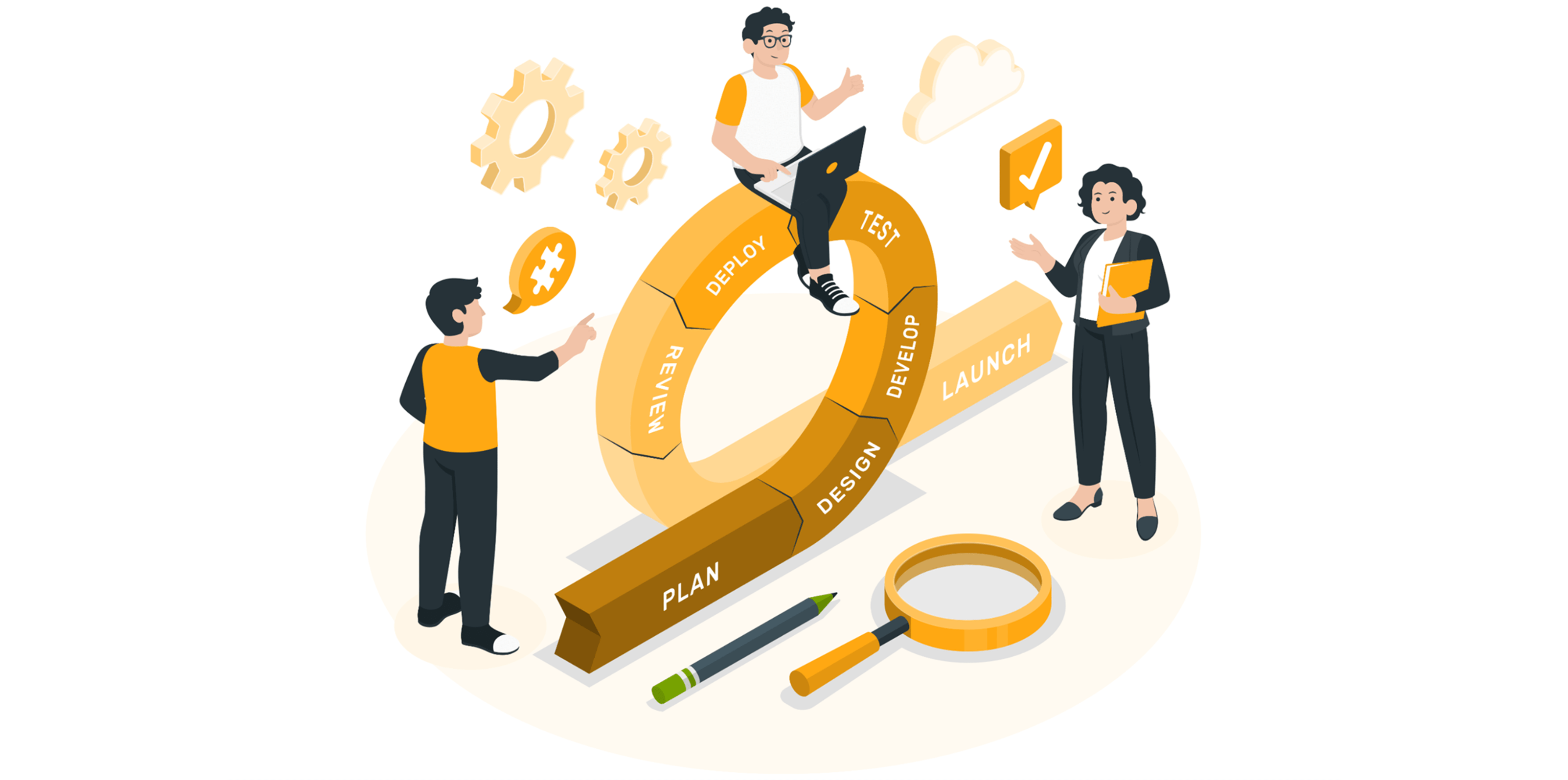In the dynamic field of mobile app development, project management is a crucial but sometimes neglected factor for success. It’s the linchpin that distinguishes between an app soaring to the top and one fading into obscurity.
This article delves into the vital role project management plays in steering app development to triumph. Through key insights and real-world case studies, we unravel the strategies, techniques, and principles emphasizing the significance of astute project management in the app development journey.
The Foundation: App Development Lifecycle
Grasping the app development lifecycle is essential—an organized journey that shapes an idea into a functional, user-friendly app. Comprising stages like ideation, planning, design, development, testing, deployment, and maintenance, each phase poses unique challenges. Without effective project management, an app project can easily veer off course.
Why does the app development lifecycle matter? It instills structure and clarity, ensuring everyone comprehends their roles, responsibilities, timelines, and objectives. Project management intricately intersects with each stage, steering the team through complexities and maintaining project alignment.
The Project Manager’s Toolkit
In the realm of app development, a project manager commands a versatile toolkit, orchestrating diverse project elements. Their responsibilities span coordinating team efforts, managing resources, and adhering to timelines. Effective communication forms the backbone of their role, ensuring alignment across team members, from developers and designers to stakeholders.
Key Responsibilities of a Project Manager in App Development:
- Setting clear project goals and expectations.
- Creating detailed project plans and timelines.
- Allocating resources efficiently.
- Risk assessment and management.
- Monitoring progress and addressing roadblocks promptly.
- Facilitating effective communication among team members.
- Adhering to budgets and timelines.
A renowned quote by Peter Drucker captures the essence of project management: “Efficiency is doing things right; effectiveness is doing the right things.” A project manager’s effectiveness relies on their adept navigation of the myriad complexities in app development.
Realizing the Vision: User-Centered Design
User-centered design stands as a pivotal aspect of app development. Beyond mere functionality, an app must deliver a seamless and enjoyable experience for users. Project managers assume a vital role in ensuring that user-centered design principles form the foundation of the development process.
User Research
User research is a cornerstone of user-centered design, delving into the needs, preferences, and pain points of the target audience. Project managers play a pivotal role in coordinating interviews, surveys, and usability testing to facilitate user research. They collect valuable insights that shape the app’s design and functionality.
Design Thinking
Design thinking, a problem-solving approach emphasizing empathy for end-users, fosters brainstorming, prototyping, and iterative testing to refine the user experience. Project managers play a pivotal role in integrating design thinking principles into the development process, fostering creativity and innovation.
Case Study: Airbnb
Airbnb’s success is, in part, attributed to its commitment to user-centered design. By conducting extensive user research and embracing design thinking, Airbnb has created an app that caters to travelers’ needs, resulting in rapid adoption and growth.
The Agile Approach
The Agile methodology has transformed the software development landscape, extending its impact on app development. Agile represents a mindset that prizes flexibility, collaboration, and customer feedback. It marks a departure from traditional waterfall methodologies, where fixed requirements at the start make changes costly and challenging to implement.
Sprints and Scrum
Agile development is defined by short development cycles, termed sprints, lasting two to four weeks and yielding a potentially shippable product increment. Scrum, among the most popular Agile frameworks, brings structure to the process with daily stand-up meetings, backlog grooming, sprint planning, and retrospectives.
Continuous Improvement
Agile fosters a culture of continuous improvement. Following each sprint, teams reflect on their processes, pinpointing areas for enhancement. This iterative approach guarantees that the app evolves in response to user feedback and adapts to changing market conditions.
Case Study: Spotify
Spotify’s success as a music streaming app is, in part, attributed to its Agile development practices. Spotify continuously delivers app updates and new features, keeping users engaged and satisfied.
Quality Assurance and Testing
Quality assurance (QA) stands as a critical phase in app development, overseen by project managers to ensure the app meets stringent quality standards and functions flawlessly.
Testing Strategies
Testing comprises diverse methodologies, encompassing both manual and automated approaches. Manual testing involves human testers navigating the app to identify issues, while automated testing utilizes scripts and tools for repetitive tests, ensuring consistent and reliable results.
User Acceptance Testing (UAT)
User Acceptance Testing (UAT) entails real users testing the app in a controlled environment to validate that it aligns with their expectations. Project managers oversee UAT, collecting feedback and addressing issues before the app’s release.
Case Study: Facebook
Facebook places a strong emphasis on quality assurance to maintain a seamless user experience across devices and platforms. Rigorous testing ensures that new features and updates do not disrupt the user experience.
App Deployment and Beyond
App deployment signifies a significant milestone, but it’s not the journey’s end. Project managers persist in playing a vital role post-launch.
Deployment Strategies
There are various deployment strategies, such as gradual rollout and continuous delivery. Project managers choose the approach that best aligns with the app’s goals and user base.
Monitoring and Maintenance
After deployment, project managers oversee ongoing maintenance, ensuring that the app remains functional, secure, and up to date.
Feedback Loops
Project managers establish feedback loops with users to gather insights for future updates. User feedback is invaluable for enhancing the app’s features and addressing pain points.
Case Study: Uber
Uber’s global expansion and ongoing optimization exemplify effective app deployment and post-launch management. By continually refining the app based on user feedback, Uber has solidified its position in the ride-sharing industry.
The Road to Success: Case Studies
WhatsApp’s disciplined project management played a pivotal role in its rapid global growth and user adoption. By prioritizing user-friendly features and efficient communication, WhatsApp became a dominant messaging app.
Instagram’s strategic project management ensured a steady stream of engaging features and updates, keeping users captivated and the platform competitive.
Trello
Trello’s Agile project management practices have made it a popular productivity app. Its intuitive design and regular feature enhancements have garnered a devoted user base.
Slack
Slack’s project management approach fostered its emergence as a communication powerhouse. By continually refining its app and adding features, Slack revolutionized workplace communication.
Conclusion
Integrating effective project management practices into app development isn’t just an option; it’s a necessity for success. Project managers act as architects, guiding teams from conception to reality. In the evolving app landscape, adaptability in project management is crucial.
To stand out and stay ahead, businesses must recognize the value of robust project management and invest in skilled project managers. Effective project management is the cornerstone of app development success, ensuring that apps not only function but thrive in a competitive market.




